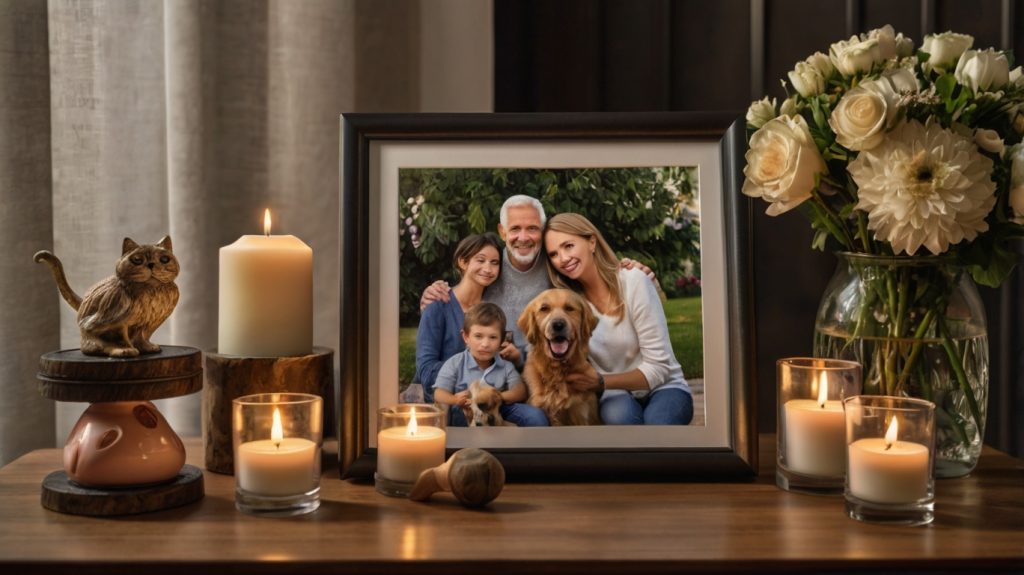Losing an animal companion with whom you shared so many beautiful memories is a very painful thing to endure. Seeing your beloved pet pass on, especially one that had been a large part of your life for a long time, is not easy to process.
Pet owners suffering from the loss of a pet are likely to experience intense feelings of sadness and sorrow. The death of a pet is not too different from the death of a person.
While it’s inevitable to feel guilty and sad when your pet dies, there are ways to cope during such a difficult time.
8 Ways To Heal After Your Pet Dies

It’s not easy to cope with the loss of a pet you were attached to. How long it takes to come to terms with a pet’s death varies from one person to another.
Here are some tips to help you stop crying over your pet’s death and deal with emotional pain.
1. It’s Okay To Mourn Your Pet’s Death
When you’ve lost an animal companion that provided you with support, loyalty, and unconditional love, feeling sad and empty is perfectly natural.
There is no wrong way to express your grief. While not everyone can relate to pet grief, you know better than most how it really feels. Acknowledge your feelings and never feel guilty or ashamed for grieving your pet.
Allow yourself to go through the grieving process. It is a healthy coping mechanism and is a great way to recover your emotional well-being while still remembering your pet.
The five stages of the grief process are denial, anger, bargaining, depression, and acceptance. However, pet grief, or any kind of grief, is not always clear-cut. You might experience all or some of these grief stages at any moment and in no particular order following the death of a pet.
When you do, it’s important to embrace your emotions and be kind and compassionate to yourself. This will help you come to terms with the sad loss and restore your emotional well-being.
2. Celebrate Your Pet’s Life

It’s very sad to see a pet go, but their fond memories will always be there. As a memento of your pet’s life, consider holding a memorial service. This is a great way to honor your furry friend and cherish the bond you had.
Be sure to involve family members or friends who were close to the pet and can relate to your feelings.
You will likely have lots of past photos and videos of your pet. Whether they’re physical or digital, you can compile these into a video or slideshow and share the highlights of your pet’s life with your loved ones.
You can also gather your pet’s items and accessories like toys and collars and place them in a memory box.
Now is a great time to share stories about your pet’s best moments. This will help cheer you and everyone up despite the tinge of melancholia you’ll be experiencing throughout the memorial.
There are plenty of ways to commemorate the life of your pet. This will help ease your grief and get you through an inevitably difficult time, especially if your pet had lived a full life.
3. Talk To Other Pet Owners
A lot of pet owners know what pet loss feels like. Reaching out to people who can relate to your loss will ease feelings of sadness and loneliness.
Thanks to the many pet loss support groups available online, finding other pet owners is easy. If you do a little more research, you will find a pet loss support group near you.
Pet loss support groups are a great way to openly express your feelings with people who can understand and sympathize with you. People can share their experiences with pet grief as well as their pets’ stories.
The moderator will typically offer support and guidance and provide practical ways to cope with pet loss according to people’s individual experiences.
Alternatively, if you’ve made friends with other pet owners, consider reaching out to them. If you have other pets, you can take them out and meet with your friends in a dog park, for instance.
Many pet owners have struggled with pet grief and are among the best people you can talk to and share what you are going through.
4. Consider Mental Health Counseling
When your beloved pet dies, you can’t help but feel a sudden major change in your life. This can cause intense and overwhelming emotions that affect your well-being, especially if you’re suffering from mental health issues already.
Turning to a therapist who specializes in loss and grief will help ease your grieving process. You’ll also receive the necessary treatment if your pet’s death has caused anxiety, depression, and other medical disorders.
You can go to a nearby therapist or look into online therapy. Even if you’re not suffering from serious mental health conditions, a therapist can help you find coping strategies and overcome your grief.
5. Help Your Family Members Pull Through

If your family members, notably your partner and children, are just as devastated by the loss of a pet, be sure to give them the emotional support they need.
Even if they take it much worse than you do, you should never belittle their feelings. Everyone grieves differently, and it’s important to acknowledge all facets of pet grief without judgment.
Sharing emotional pain with your family will help you cope better with the sad loss.
It’s important to talk openly about your feelings with your family and support them when they’re sad. Everyone should go through their grieving process at their own pace.
It often helps to gather around from time to time and share pleasant stories involving your pet. However, be mindful to allow them to cope with their grief in their own way, particularly when they feel really sad whenever they talk about the pet.
Emotional support can take many forms. Taking your mind off a distressing event is often a great way to heal your pain. This doesn’t mean ignoring or denying your feelings but rather creating new pleasant memories and sharing them with your loved ones.
Grief comes and goes as it pleases, especially in the early stages following a pet’s death. Help your family cope and rely on their support whenever necessary.
6. Reach Out To Your Friends
If you have friends to whom your pet meant a lot, you can rely on their support. Be sure to reach out to them and speak with them frankly. You can go on a walk, invite them over, or go on a trip.
If you ever feel down and need someone to talk to, don’t hesitate to be open and honest with them; it’s what friends are for.
7. Establish New Daily Routines

The loss of a pet is a destabilizing experience in many ways. You had to care for your pet and engage in a wide variety of activities. Naturally, when your pet dies, your normal routine will be thrown off balance.
This can increase the sense of loss and grief and significantly affect your well-being. Establishing a new routine can restore structure and balance in your everyday life, which will help you bounce back physically, mentally, and emotionally.
A healthy routine will help keep you busy enough to cope better with your emotions; you’ll be more apt to manage stress and anxiety.
Here are examples of healthy routines you may consider.
- Physical activity: Exercising, walking, jogging, hiking, yoga, etc.
- Maintaining a consistent sleep schedule.
- Adopting a healthy diet.
- Establishing a bedtime routine: Reading, music, meditation, hot beverage, shower, etc.
- Spending time outside.
- Spending time with your loved ones.
When dealing with the passing of a beloved pet, you should take good care of yourself. Maintaining healthy daily routines is the best manifestation of self-compassion.
8. Get A New Special Friend

If this is your first time dealing with the loss of a pet, allow yourself all the space and time needed to grieve. At some point, you might consider bringing a new animal friend into your life.
Many people are so overwhelmed with sadness that they vow never to get another pet. However, time usually heals emotional pain and the joy of having a new animal companion can help you deal with the life/death cycle.
Getting a new pet is a very personal decision. It’s advised that you not rush your new rescue or adoption if you still struggle with your pet’s death. A new pet is more than just a replacement; it is a new special companion with whom you’ll create lots of new stories and wonderful memories.
When the time is right, you might find that a new pet will help ease loneliness. By then, you will have moved forward and paved your way toward a new beginning.
Why Does A Pet’s Death Hurt So Much?
The emotional pain caused by the death of an animal companion is overwhelming. It can be a truly traumatic experience, especially for children and those who witness the dying process.
Pet owners are left with a profound sense of emptiness that is difficult to pull themselves out of. Each person has their own grief process which can last anywhere from days to years.
Many will think they could have done something to prolong their pet’s life and will consequently feel guilty.
The experience is painful in many ways, regardless of the circumstances of the pet loss.
More Than Just A Pet
One of the main reasons why the loss of a pet causes so much pain is that not everyone can relate. As a result, many people have to go through their grief alone.
It’s not uncommon for people to try to console their friends by saying that it’s just a dog or cat and that they will be fine in time. A big part of your life is removed when your beloved pet dies.
This often causes what psychologists refer to as disenfranchised grief: A state where you cannot openly acknowledge your grief because it doesn’t fit with social norms. This can lead to increased feelings of loneliness and make the grieving process harder.
An animal companion is much more than just a pet. They hold a special place as a beloved member of your family who has nothing but unconditional love for you.
A New Pet Never Replaces The Lost One
The relationship a pet owner builds with their animal friend over the years is special. Such a strong and unique bond cannot be replaced simply by getting a new pet.
“It’s not a big deal. You can get a new pet” is another example of “comforting” words that many pet owners hear after losing a pet. This shows a lack of understanding of a person’s relationship and doesn’t help with the grieving process.
Parents often console their children by promising to get them a new pet. While this is not a horrible way to console someone, it is not very effective and does not acknowledge the special bond a pet owner has with their pet.
Although you may well love and cherish a new pet, or your other pets if you have any, you will always distinctively remember the memories you shared with the pet you lost.
You will remember their qualities, daily routines, and the many times they messed things up and innocently looked at you.
A loved person is irreplaceable, and neither is a beloved pet.
Final Thoughts
Taking care of a pet is one of the most fulfilling experiences in one’s life. Their companionship is priceless and a source of delight and happiness. Sadly, this makes losing a pet a very disheartening event that is not easy to get through.
Dealing with a pet’s death takes time, patience, and several healthy practices. By taking care of yourself and keeping compassionate and understanding people around you, you can get through your grief and start a new chapter in your life.
If you are overwhelmed by sadness and grief, you can always try therapy or join a pet loss support group. It is natural to grieve the death of a pet, but the important thing is to come out in good shape at the end of the day.
